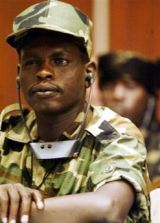Darfur talks at stalemate over power-sharing dispute
Jan 4, 2006 (ABUJA) — Talks between the warring parties of Sudan’s Darfur region over power-sharing arrangements are deadlocked, impeding the search for an overall peace deal to end three years of bloodshed, negotiators said on Wednesday.
 Two Darfur rebel movements and the Sudanese government are deep into a seventh round of peace talks in the Nigerian capital but they have had to put aside two critical power-sharing issues after weeks of detailed talks failed to achieve progress.
Two Darfur rebel movements and the Sudanese government are deep into a seventh round of peace talks in the Nigerian capital but they have had to put aside two critical power-sharing issues after weeks of detailed talks failed to achieve progress.
“There’s no basis for understanding between the parties on these issues. As far as power-sharing is concerned, it’s not moving at all,” said Ahmed Tugod, chief negotiator for the rebel Justice and Equality Movement (JEM).
The other two main areas of negotiation are wealth-sharing and security arrangements, but Tugod said any progress in those areas would be meaningless without agreement on power-sharing.
The JEM and the larger Sudan Liberation Army (SLA) took up arms against the government in early 2003 complaining of marginalisation. Khartoum responded by backing proxy militias to fight the rebels in Darfur, a desert region the size of France.
The violence killed tens of thousands of people and drove more than 2 million from their homes into refugee camps in Darfur and neighbouring Chad. The International Criminal Court is investigating alleged war crimes in Darfur.
The African Union (AU), which has 6,000 peacekeepers in Darfur and is the main mediator in the talks, said on Tuesday a crisis between Sudan and Chad risked damaging the Darfur peace process and called on the neighbours to resolve it immediately.
The dispute flared after a Dec. 18 attack by Chadian rebels on a town on the border with Sudan. Chad accuses Sudan of backing the rebels, which Sudan denies.
REBEL DEMANDS
The AU said the parties at the Darfur peace talks had now agreed on 80 percent of the points under discussion concerning wealth-sharing. On security arrangements, they were discussing item one of a five-point agenda that took weeks to agree.
But the AU said an attempt to move forward on power-sharing by negotiating in smaller groups, launched on Dec. 23, had failed and the contentious issues had been parked for now.
The sticking points are the rebels’ demand for a new post of vice-president to be created that would be attributed to a representative of Darfur, and for the three states that make up Darfur to merge into one region with an autonomous government.
Government negotiators say the Darfur rebels are trying to replicate a peace agreement reached a year ago by Khartoum and rebels from southern Sudan, who fought a separate, bloodier insurgency that was Africa’s longest-running civil war.
The southern Sudan People’s Liberation Movement (SPLM), now part of the government, obtained a post of first vice-president and an autonomous regional government under the Comprehensive Peace Agreement (CPA). Southern Sudan also has the option to hold a referendum on secession six years after the peace deal.
But the government team says the situation of southern Sudan is completely different from that of Darfur, which they say is part of the broader north rather than being a separate region.
“They are trying to simulate the CPA but it is not the right time,” said Timothy Chol, who is negotiating on power-sharing from the government side. He is a member of the SPLM.
Chol said the north-south peace deal had established a temporary framework for power-sharing at the national level that should be maintained until elections scheduled to take place in two and a half years. He said the Darfur conflict should be resolved within that framework.
But the JEM’s Tugod said the government’s position on these issues showed Khartoum was not serious about resolving the Darfur conflict through a political solution.
(Reuters)
